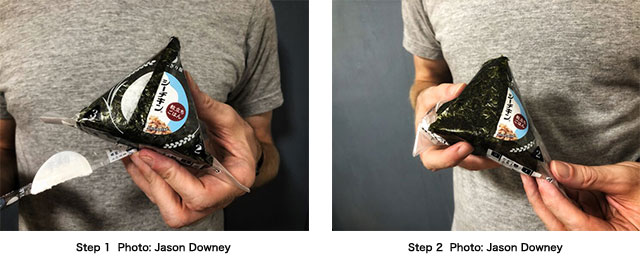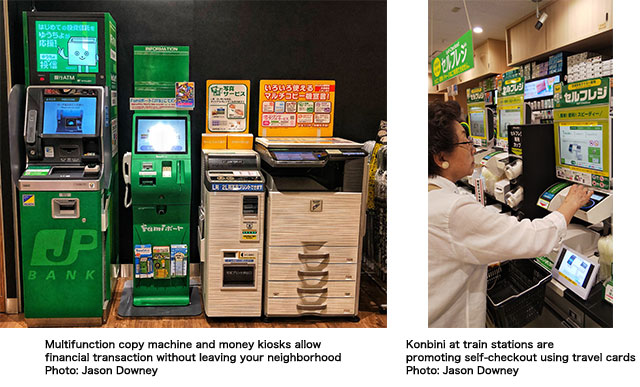News
October - Convenience of Konbini: Do We Need More or Less? Updated in October 2019
The onigiri is the most popular food item at Japanese convenience stores, or konbini. Onigiri are balls of rice, typically triangular, containing a small amount of filling─pickled plum, salted salmon, tuna & mayonnaise, etc.─and an outer layer of dried crispy seaweed called nori. 7-Eleven regularly sells over a billion of these per year. But the crunchy texture of the outer nori is difficult to keep. The rice will quickly dampen the nori, leading to sticky fingers. To counter this problem 7-Eleven devised a solution in 1978: a sophisticated plastic package that wraps in-between the rice and nori; this keeps them separate until you unwrap and eat it.

This packaging which now comes in biomass plastic and botanical ink is a highly specialized solution, engineered in pursuit of a smoother customer experience. Such attention to fine detail over the past 45 years has resulted in the remarkable type of convenience stores that are common around major Asian cities today.
In the early 1970s, Suzuki Toshifumi and his colleagues were on a business trip in the US when he discovered a 7-Eleven store in Dallas, Texas. Suzuki believed that convenience stores would be a strong competitor to supermarkets in Japan, and set about negotiating a licensing contract with 7-Eleven’s parent company. In 1974, he and his partners opened Japan’s first convenience store in Toyosu, in the Kōtō District of Tokyo. These days, Japan is home to nearly 60,000 convenience stores.
Besides staples like phone-charging cables, and travel-sized toiletries, Japan’s konbini focus on weather merchandising to sell seasonal items. In spring, you can get high-end surgical masks that prevent harmful particles or pollens from entering your windpipe. Come summer, cold noodles would be available, as well as swimming goggles and sweat-wipes. Konbini-desserts featuring pumpkin, sweet potatoes or chestnuts announce the arrival of autumn. In winter, they will display gloves and scarves, alongside hot drinks and snacks like oden and nikuman. You can even pre-order birthday cakes, or elaborate new year dishes to go. For the health-conscious, konbini chains are now developing more low-carbohydrate food items and sweets. Some of recent onigiri options include wild-rice, traditional grains and beans that are supposed to cleanse your gut. They can be eaten by vegetarians or vegans, too.
In addition, at almost any konbini in the country, you can:
- pay utility bills, mail order bills, tax, or national health insurance, add money to your travel card (Suica/PASMO); wire money overseas (need prior web registration); get motorcycle/bicycle insurance
- photocopy, scan or print documents and photos, or send/receive faxes, order new year cards;
- send/receive letters and packages, buy postal stamps/revenue stamps, receive ordered goods from Amazon/Rakuten;
- and pay for domestic flights or intercity coach, entertainment tickets, and certification tests like TOEIC, reserved online.

Shopping at konbini for daily necessities used to be expensive. But now, major konbini chains are coming up with their own affordable line of private brands for drinks, frozen items, and detergents, etc. in smaller portions. This strategy has successfully driven singles, working couples and elderly shoppers back to the konbini. Furthermore, the taste, originality and accessibility of konbini food items have improved so much in the past decades that the konbini chains are now threatening local cake shops and restaurant chains.
The high population density of Japanese cities has allowed these one-stop-konbini to develop rapidly over the past 45 years, for locals and travelers alike, but the saturated market is sparking fierce competition among stores located close to each other. This fight for market dominance is depriving konbini-owners and staff from taking sufficient breaks. Some chains are allowing owners to experiment with early closing time, but the headquarter doesn’t want owners to close one full day (e.g. Sunday) in fear of losing business. Plus, part-time staff have to be thoroughly trained to handle the many complicated tasks associated with konbini work nowadays. As a country prone to natural disasters, konbini are also expected to function as a hub to help local communities recover after earthquakes and typhoons, especially for senior citizens who are only physically able to access nearby shops. Faced with various ethical, social and marketing issues, the konbini industry is coming to a crossroad.







